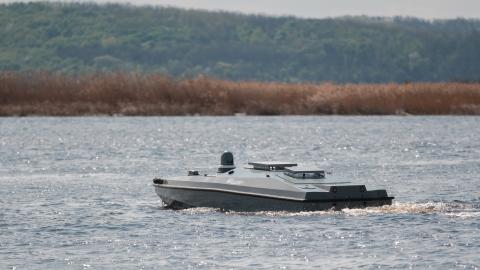A significant development in the war in Ukraine is not getting much attention. The last Russian warship departed occupied Crimea last week, according to the head of the Ukrainian Navy. While the peninsula remains under Russian control, its ports have not been safe for Vladimir Putin’s warships for months.
The first reports of military vessels departing Crimea for safer ports inside the Russian Federation came this year. After months of airstrikes and naval drone attacks, it seems that Russia’s Black Sea Fleet has moved for good.
There is no doubt Ukraine is winning the battle for the Black Sea. The numbers speak for themselves. The first major blow to the Russian Navy came in the early months of the war. In April 2022, Ukraine sank the Moskva, the Black Sea Fleet’s flagship. In October 2022, Ukraine used unmanned naval drones to severely damage a Ropucha-class landing ship in Novorossiysk, the first time in the history of naval warfare that a drone had struck an enemy vessel. Last September, Ukraine used British air-launched cruise missiles to destroy a Russian attack submarine worth $350 million in a drydock in Crimea. The list goes on. In total, Ukraine has damaged or destroyed at least a third of the Russian Black Sea Fleet.
With the departure of Russian warships from Crimea, there are four important geopolitical observations.
First, Ukraine has rewritten the rules of naval warfare. Most of its navy was destroyed during Russia's annexation of Crimea in 2014, and what remained was taken when Russia invaded again in February 2022. Without a conventional navy, the Ukrainians had to be bold and creative if they were to take on the Black Sea Fleet. Their repeated use of naval drones is a pivotal moment, in the same way an aircraft was first used to bomb targets in combat during the Italo-Turkish War in the early 20th century.
Unmanned systems are sure to play an important role in naval warfare in the future. As the world is witnessing in the Black Sea, both sides are racing to improve their technology. The Ukrainians are routinely unveiling more modern and capable drones while the Russians are continuously improving their defensive capabilities to counter this threat. Other countries are learning lessons from the Black Sea, especially in regions with naval competition such as the Gulf, the Caspian Sea and the South China Sea.
The second observation regards the global significance of the Black Sea. It is a regional body of water, but control of it has global implications. Before the invasion in 2022, Ukraine was the world’s largest exporter of sunflower oil, the fourth-largest exporter of corn, and the fifth-largest exporter of wheat. When the fighting broke out the future of those agricultural exports was placed in doubt. Many countries in North Africa and the Middle East were particularly concerned about food security. Thanks to Ukraine’s naval success in the Black Sea, its agricultural exports are now at pre-war levels.
Third, Türkiye has emerged as another winner in the battle of the Black Sea. For centuries the Russian empire and the Ottomans were either in conflict or competition for influence and control of the Black Sea region. Since the late 16th century, Türkiye and Russia have fought at least 12 major wars. Depending on how one counts, at least nine of them were over Crimea.
After the Second World War, Stalin’s designs on eastern Anatolia and the old Soviet Union’s wish to control the Turkish Straits were what originally drove Türkiye into NATO’s arms. Publicly, President Recep Tayyip Erdoğan performs a balancing act when it comes to engagement with Ukraine and Russia. However, even if Türkiye’s national security establishment won’t admit it publicly, they know that a weaker Russia in the Black Sea means a stronger Türkiye.
This explains why Türkiye has closed the straits to Russian warships trying to enter or leaving the Black Sea, has been an outspoken critic of Russia’s annexation of Crimea, and is building Ukrainian warships in Turkish shipyards.
Finally, the Caspian Sea is increasing in strategic importance. Russian warships operating from there routinely launch cruise missiles against Ukraine. As Russia is squeezed more in the Black Sea, the Caspian will become even more important. Its use for cruise missile launches gives Russia a strategic depth and a degree of protection not found in more contested areas, such as the eastern Mediterranean or the Black Sea.
The Caspian is connected to the Black Sea by the Volga-Don Canal, and ships from Russia’s Caspian Flotilla have played a direct role in supporting the invasion of Ukraine since 2022. With Türkiye’s closure of the straits entering the Black Sea, the flotilla is the only means of reinforcing the Black Sea Fleet. Furthermore, Iran has delivered drones that Russia has used against Ukraine either via the Caspian and Volga-Don Canal or an air corridor over the sea. Until recently, few global policymakers appreciated the geopolitical importance of the Caspian Sea but the war in Ukraine is changing this.
For Russia, control over Crimea was the main reason it attacked Ukraine in 2014. For Ukraine, it will be hard to ever be truly secure and safe from Russia without regaining control of the peninsula. As the battle for the Black Sea rages, lessons are being learned all over the world and the nature of naval warfare has changed for ever.
The Black Sea Fleet’s retreat from Crimea marks an important point in the war. Whether it marks a turning point remains to be seen.
Enjoyed this article? Subscribe to Hudson’s newsletters to stay up to date with our latest content.



















